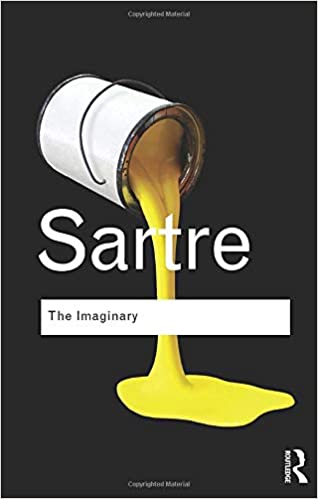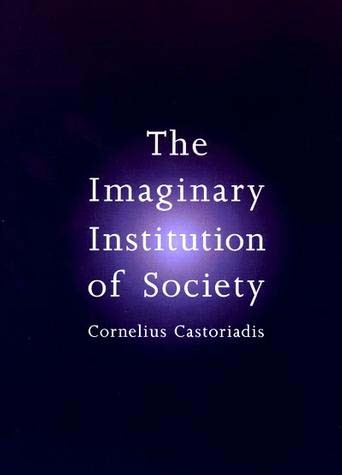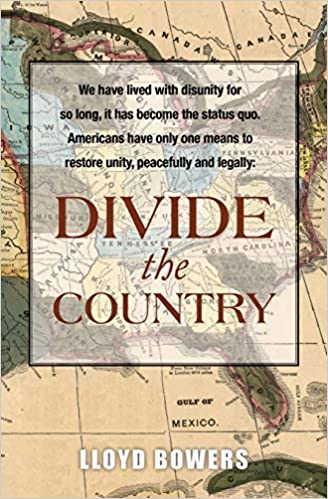The Republican Imaginary
Maybe I should explain why I use "imaginary" as a noun. Actually, I will let social scientists from the University of Nottingham in the U.K. do the explaining:
The word "imaginary" used as a noun is a jargon term that has been gaining currency in a
number of social sciences. . . . "The imaginary or social imaginary is the set of values,
institutions, laws, and symbols, common to a particular social group and the corresponding
society through which people imagine their social whole."
The social scientists at Univ. Nott. tell us that their use of "imaginary" as a noun grates on people who customarily use it as an adjective to describe something imagined—imaginary friends, romances, or exploits. As a noun, "imaginary" suggests our fantasy society, how if would look if we could control all the variables. If we could daydream a society from the ground up, how we would build it.
-1. Jean Paul Sartre's The Imaginary: "Because imaginary objects appear to us in a way which
is like a perception . . . we have a tendency to treat them as if they were real. . . . We know that
they are imaginary, but we . . . ascribe emotions, traits, and beliefs to these irreal objects."
-2. Cornelius Castoriadis's The Imaginary Institution of Society: "The imaginary of the society . . . creates for each historical period its singular way of living, seeing, and making its own existence.
-3. Benedict Anderson's Imagined Communities "treated the nation as an imagined political community . . . nation-ness as well as nationalism, are cultural artifacts of a paricular kind.
As writing goes, it appears to be over our heads. Maybe it is, really. But dissect the quotes and look at what they say. Sartre: "We ascribe emotions, traits, and beliefs" to our social imaginary. Anderson says the "imagined political community" gives us a sense of "nation-ness as well as nationalism."
So, the high-brow text aside, Sartre and the other writers are talking about something important. As a nation, and certainly for Republicans in particular, we need to remind ourselves of the Republican Social Imaginary, how our nation should look apart from the Democrats.
On the one hand, we respond to our circumstances in real-time, and we don't have a lot of time to think about anything, except stop-lights, job opportunities, dental appointments and so on—the whole panoply of human experiences in a modern, mechanized society. On the other, we maintain our Social Imaginary—how we would like for our society to function. The Imaginary maintains our dreams and goals of a social ideal.
During these turbulent times, reminding ourselves of the Republican Imaginary has a greater importance. We know the current standoff can't last. At some point, we have to go our own way and let the Democrats go theirs. We need to divide our hopelessly polarized nation in order to save it from civil war, disorder, and conquest by a foreign power.
We need to separate in order to allow the new nations greater lattitude in governing, achieve greater functionality than they have at present, and remove the paranoia and dissension that hurts the corporate whole so much.
So, in 2020, I published a book titled Divide the Country. We need to revitalize our nation, and we can only do that by allowing it to divide. We can regain proper fitness again by regrouping and reuniting. Divide the Country hasn't exactly taken the world by storm. Denial, pessimism, and indifference keep Americans from responding pro-actively. But before we can recover unity, we need to dust off our Social Imaginary—our vision of how the nation should run. Maybe that will revive out spirits.
I vote Republican and live by conservative values. I don't believe they are absolutely superior to the Democrats and their liberal values, but they are different, and they are incompatible. Trying to make the different systems work in the context of one nation is silly as hell. Unfortunately, it has become the status quo, which renders us helpless to a degree.
A lot of people will agree with my assessment, that America suffers from unfocused, uneven functionality and has lost necessary life-force as a result. We can excuse it by saying it has been this way for such a long time; we just have to accept it and make the best of it.
Not me!!!
Let me tell my readers, if you care about the future of our nation and its traditional culture of freedom, and you have a few imaginaries of your own ruminating up your sleeve, now is the time to talk about them. In the mean-time, let me tell you about my Republican Imaginary.
Just suppose. . . . I take control of the country and decide that the best course for the nation—the course that gets everyone off the hook, saves lives, and gives everyone a sporting chance at determining their own destinies, fulfilling their deepest intentions toward nationhood, providing unity, and peaceful functioning—is to let Democrats and Republicans govern themselves within their own national boundaries.
Republican and Democrat imaginaries lack sufficient inclusivity and congruence to make them work in the context of one nation. Have I made the point clear enough? Why is this so hard for Americans to grasp? Just fear of change?
Too many Republicans talk like one-man islands, like Popeye the Sailor Man's song: "I yam what I yam. That's all what I yam." The vanity of exaggerated self-definition knows no end, and suggests a lack of perception about how to move the country out of its division and dysfunction into regained harmony and unity.
Republicans may talk like an Army of One, but they still have to make concessions to political reality and arbitrary authority. They have to pay taxes for things they do not support or condone, and turn a blind eye toward the vindictive electorate in the other party. Until we have the gumption to go our own way, we are stuck with an uncertain future.
No man is an island. Let's at least choose who we want on the island with us. We can do better if our fellow citizens are on the same page with us, rather than clashing with us, day after day.
Why I Believe in the Republican Imaginary
-1. Private Capital:
Americans are so accustomed to lots of private capital, we need to learn more about nations that don't have any. My wake-up call came I visited Great-great-grandfather John Siegling's hometown in Erfurt, Germany—the old East Germany, a Soviet state where nobody owned any private property. It all belonged to the "People." Industrial-plants, shoe-repair shops, auto-repair shops, they all belonged to the people, called in German "Volkseigenerbetrieb," or VEB. In a few East German cities, you can still see a "VEB" sign on a building. Citizens keep it for old-times' sake.
Since no one wanted to come under suspicion for making a profit and accumulating capital, all those public enterprises ran themselves into the ground. No one had the capital to repair or improve machinery; no one had the capital to improve a product-line. Since they could not make money, they simply had no incentive to do anything. When the old machines broke down, repairs took a lot longer. This led to every kind of shortage.
So, the Republican Imaginary stresses profit, the accumulation of lots of captial—not just to pay anticipated expenses or periodic maintenance, but also to enable research and development of new products and machinery, to make it fast, better, and cheaper.
Anyone with a convincing product concept, a scientific formula, or improvement on an industrial process can start his own company. All he needs is a venture capitalist to invest in him. They will own the new company together. Our way of life absolutely depends on capital. How in the world did leftists get away with concealing this basic fact?
-2. Stocks, Bonds, and Real Estate
When the local National Public Radio affiliate started giving out stock-market news during its evening new programs, listeners complained. Since the commentators only read out the complaints on the air, without identifying the complainers, I thought the complainers could have been college students, or grown-ups who did not know much about the importance of the stock market, and believe that only crooks and gamblers utilize it.
In fact, successful start-up companies can't wait to "go public," to start selling shares of stock in the stock market. If the investors believe in the start-up company, they will snatch up the shares of stock and the value of the stock will take off like a rocket. The increase in value gives the shareholders more capital. It will tempt other investors to invest some money and ride aboard that rocket, too.
Pension-plan directors employ full-time investment counselors to find better ways to make money for their pension funds. Few people know the ways of the stock market better than they. Government workers, nurses, teachers, and a variety of other people depend on pension funds when they retire. In today's investment world, those groups fall under the heading "institutional investor."
Insurance companies are also instutional investors. The variety of players makes the stock market the most important non-voting interest-group in today's political world. So many people count on the stock market, if a US President or Congress lets it tank, he will probably lose the next election.
-3. Private Spaces:
Private Spaces is just another academic term for private associations. In principle, it means only that you can hang out with whomever you want. If you have any money lying around, you might start talking about what you could do with it to make more money. You might decide to start a private club of investors. Maybe the members will only talk about boats and sailing. The club might decide to invest in a few boats of its own. Private associations act serendipitously. You don't know what they might get up to, unless you start one.
Once again, my visits to Erfurt revealed to me the importance of private associations. During the Nazi and Soviet eras, no one could have a private associations. The Nazis and Soviets did not like anything private. Every choral society, stamp-collectors' club, birdwatchers, etc. must have a party member as its leader and must conform to party regulations to stay out of trouble, and they absolutely could not involve themselves in any profit-making schemes.
Increasingly in America, private associations find themselves on the defensive, as the Left, assisted by government busybodies, push tolerance and diversity over freedom of association, and warn against private privilege. Americans on the Right must learn from the German experience. The Republican Imaginary must stress non-interference by the government. The Democrat Imaginary cannot recognize the utility of private associations. Interference just comes with the territory.




